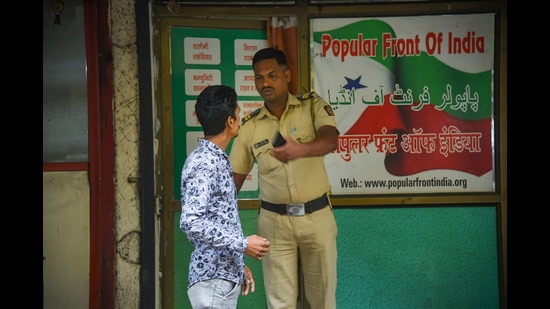Act quickly and without bias in PFI investigation
Both the NIA and the ED have their work cut out for them. They will have to track down other unidentified elements associated with the PFI before they can reorganise themselves. Unravelling their international connections is of paramount importance
The recent countrywide action against members of the Popular Front of India (PFI) by the National Investigation Agency (NIA), the Enforcement Directorate (ED) and state police forces generated an animated but divisive debate. A vocal camp is convinced that the PFI was victimised for pushing a determined pro-Muslim agenda. Equally vociferous is another sizable section that lauds the establishment for what it considers a refreshing and clinical operation against a group bent upon destabilising public order. Dispassionate observers, however, may find that the truth lies somewhere in between.

The PFI came into being in 2006 through a merger of three Islamic groups, which attracted official attention for employing militant language and painting the whole Muslim community as victims of Hindu bias. This was the explosive backdrop against which the PFI made it clear that it was determined to fight Hindu Right-wing elements, using whatever means were necessary and available. A fallout of this agenda was the proliferation of violence over the last decade, especially in southern India. Kerala, which houses a large and influential Muslim population, is a stronghold of the PFI and clashes have often erupted over alleged injustice to the community.
In the early days, the police response was tardy and sporadic. This was apparently because of a lack of clear direction from the political executive and a confused police hierarchy, which was yet to build a consensus on the needed mechanics to handle the PFI threat. The police leadership was wary that it should not expose itself to charges of excess or religious prejudice.
The Narendra Modi government’s arrival in 2014 and a change of guard in some states brought clarity to the law enforcement’s approach and mission. The political direction is clear now and in favour of tough action. We have witnessed this in the form of the recent raids and the seizure of vital documents. It was refreshing that the agencies did not mince matters while interacting with the media. Their transparency is promising for the future.
The agencies have been categorical that the operation was conducted only after an assiduous collection of evidence and the determination of identity of misguided PFI cadres and sympathisers. This indicates painstaking homework to establish unlawful conduct. Minor incidents of violence that followed are an indication of the fact that the PFI leadership was caught unawares. Both the NIA and ED need to be complimented for keeping the confidentiality of their plans. In many operations, sensitive information is leaked in advance to offenders and suspects by betrayers within law enforcement.
There is also reason to believe that some PFI cadre were mixed up with terrorist elements across the border. This does not come as a surprise. The existence of a nexus has been known for quite a few years and had to be broken. To say that there was no national security implication in what the PFI was doing underground is too facile to believe and swallow. If at all the government is to be blamed, it is only for not acting earlier. But I believe it was worth waiting for rather than acting on incomplete and fragile evidence.
What are the challenges ahead? There are many complicated issues. Only a small percentage of the work has been done. There are two aspects of the mission that call for close scrutiny.
Both the NIA and the ED have their work cut out for them. They will have to track down other unidentified elements associated with the PFI before they can reorganise themselves. Unravelling their international connections is of paramount importance. I am confident that both the Intelligence Bureau and Research and Analysis Wing will rise to the occasion. Fortunately, I do not yet hear of any turf war between the official agencies. This augurs well for the future. A strong political leadership is behind this unison that marks the current scene.
Since we have good relations with many western nations, we should be able to get the unstinted cooperation of their intelligence outfits. The PFI’s agenda is obviously to cause inter-religious strife in India and its neighbourhood. We need to root this out.
The second formidable task is the successful prosecution of those arrested last week. Evidence collected till now has to be sifted through scrupulously and placed before competent prosecutors. We do not want obsequious law officers. We want demanding and straightforward ones who will question every piece of evidence put up by the investigating officers before clearing it. Shoddy investigation and court work have been the bane of many crucial cases in the past. If the NIA and ED have to acquire more credibility, their investigations will have to be near perfect, admittedly a tough objective in cases of well-orchestrated terror.
A final thought. No investigating agency is omniscient or infallible. A few of the recent arrests could have been misguided. Admission of errors will only enhance the reputation of the agency concerned.
RK Raghavan is a former CBI director and currently professor of criminal justice and policing, OP Jindal Global University The views expressed are personal
All Access.
One Subscription.
Get 360° coverage—from daily headlines
to 100 year archives.



HT App & Website






